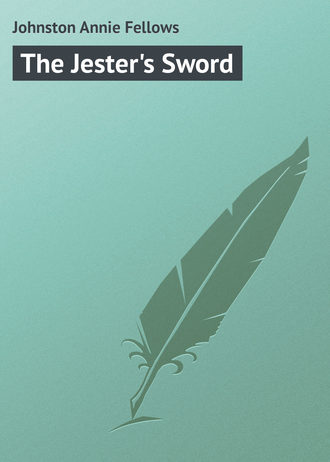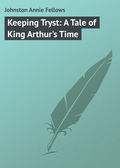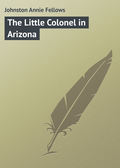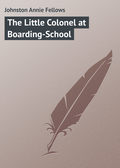
Johnston Annie Fellows
The Jester's Sword
While he thus mused, footsteps came up the mountainside, a lusty voice was raised in song, and before he could draw back into cover, a head in a fantastic cap appeared above the bushes. It was the village Jester capering along the path as if the world were thistledown and every day a holiday. But when he saw Aldebaran he stopped agape and crossed himself. Then he pushed nearer.
Now those who saw the Jester only on a market day or at the country fair plying his trade of merriment for all 'twas worth knew not a sage was hid behind that motley or that his sympathies were tender as a saint's. Yet so it was. The motto written deep across his heart was this: "To ease the burden of the world!" It was beyond belief how wise he'd grown in wheedling men to think no load lay on their shoulders. Now he stood and gazed upon the prostrate man who turned away his face and would not answer his low-spoken words: "What ails thee, brother?"
It boots not in this tale what wiles he used to gain Aldebaran's ear and tongue. Another man most surely must have failed, because he shrank from pity as from salt rubbed in a wound, and felt that none could hear his woeful history and not bestow that pity. But if the Jester felt its throbs he gave no sign. Seated beside him on the grass he talked in the light tone that served his trade, as if Aldebaran's woes were but a flight of swallows 'cross a summer sky, and would as soon be gone. And when between his quirks he'd drawn the piteous tale entirely from him, he doubled up with laughter and smote his sides.
"And I'm the fool and thou'rt the sage!" he gasped between his peals of mirth. "Gadzooks! Methinks it is the other way around. Why, look ye, man! Here thou dost go a-junketing through all the earth to find a chance to show unequalled courage, and when kind Fate doth shove it underneath thy very nose, thou turn'st away, lamenting. I've heard of those who know not beans although the bag be opened, and now I laugh to see one of that very kind before me."
Then dropping his unseemly mirth and all his wanton raillery, he stood up with his face a-shine, and spake as if he were the heaven-sent messenger of hope.
"Rise up!" he cried. "Knowest thou not it takes a thousandfold more courage to sheathe the sword when one is all on fire for action than to go forth against the greatest foe? Here is thy chance to show the world the kingliest spirit it has ever known! Here is a phalanx thou mayst meet all single-handed – a daily struggle with a host of hurts that cut thee to the quick. This sheathèd sword upon thy side will stab thee hourly with deeper thrusts than any adversary can give. 'Twill be a daily 'minder of thy thwarted hopes. For foiled ambition is the hydra-headed monster of the Lerna marsh. Two heads will rise for every one thou severest. 'Twill be a fight till death. Art brave enough to lift the gauntlet that Despair flings down and wage this warfare to thy very grave?'"
Such call to arms seemed mockery as Aldebaran looked down upon his twisted limbs, but as the bloodstone on his finger met his sight his kingly soul leapt up. "I'll keep the oath!" he cried, and struggling to his feet laid hand upon the jewelled hilt that decked his side.
"By sheathèd sword, since blade is now denied me," he swore. "I'll win the future that my stars foretold!"
In that exalted moment all things seemed possible, and though his body limped as haltingly he followed on behind his new-found friend, his spirit walked erect, and faced his future for the time, undaunted.
His merry-Andrew of a host made festival when they at last came to his dwelling; lit a great fire upon the hearth, brewed him a drink that warmed him to the core, brought wheaten loaves and set a bit of savoury meat to turning on the spit.
"Ho, ho!" he laughed. "They say it is an ill wind that blows good to none. Now thou dost prove the proverb. The tempest that didst blow thee from thy course mayhap may send me on my way rejoicing. I long have wished to leave this land and seek the distant province where my kindred dwell, but there was never one to take my place. And when I spake of going, my townsmen said me nay. 'Twas quite as bad, they vowed, as if the priest should suddenly desert his parish, with none to shepherd his abandoned flock. 'Who'll cheer us in our doldrums?' they demanded. 'Who'll help us bear our troubles by making us forget them? Thou canst not leave us, Piper, until some other merry soul comes by to set our feet a-dancing.' Now thou art come."
"Yes, I! A merry soul indeed!" Aldebaran cried in bitterness.
"Well, maybe not quite that," his host admitted. "But thou couldst pass as one. Thou couldst at least put on my grotesque garb, couldst learn the quips and quirks by which I make men laugh. Thou wouldst not be the first man who has hid an aching heart behind a smile. The tune thou pipest may not bring thee pleasure, but if it sets the world to dancing it is enough. And, too, it is an honest way to earn thy bread. Canst think of any other?"
Aldebaran hid his face within his hands. "No, no!" he groaned. "There is no other way, and yet my soul abhors the thought, that I, a king's son, should descend to this! The jester's motley and the cap and bells. How can I play such a part?"







